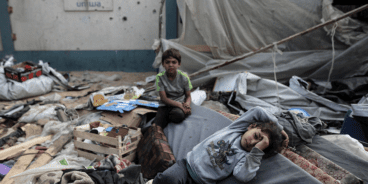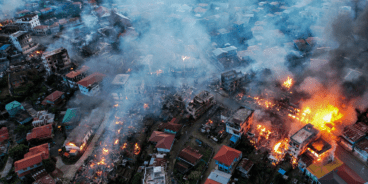
The Asia Pacific Partnership for Atrocity Prevention (APPAP) Members Statement on Myanmar
The Asia Pacific Partnership for Atrocity Prevention (APPAP) is an alliance of organisations working to promote human rights and support atrocity prevention in the region.
The undersigned members of APPAP hold grave concerns for civilians, and ethnic and religious minorities in Myanmar, including the stateless Rohingyas, following reports of increased violence in Rakhine State between Arakan Army insurgents and the Tatmadaw, as well as violent attacks on Muslims during the Ramadan period in Yangon. We call on the Myanmar Government and the military to uphold the responsibility to protect all citizens and vulnerable populations from atrocities.
A number of recent indicators, including threats against minority groups and a flare up of violence, may signal an increased risk of forthcoming atrocities. In mid-May, threats of violence by nationalist groups forced the closure of three places of worship in the capital Yangon, temporarily being used by Muslims during the month of Ramadan. Authorities have failed to hold perpetrators accountable.
Local human rights defenders and civil society organisations are alert to the escalation. Our concerns are reinforced by Amnesty International’s new report which clearly documents a surge in violence in Rakhine State during the first half of 2019. With civilians bearing the brunt of clashes between Myanmar’s military and non-state armed group, the Arakan Army, we are calling for the government to lift restrictions on delivery of humanitarian aid, and to provide access to the region for human rights groups and journalists.
Several underlying risk factors of atrocity are present in Myanmar, including a history of government instability and authoritarian rule, along with the perpetration of human rights abuses over a long period of time. These factors are compounded by crimes committed against Rohingya Muslims in 2017–which may amount to genocide–along with official denial by the Myanmar Government.
The government continues to claim it did not have a policy of ethnic cleansing or genocide, and denies the widespread evidence of sexual violence committed by the Tatmadaw against Muslim civilians in Rakhine State. This is despite numerous testimonies documenting systematic sexual violence and reports of Rohingya women giving birth to babies born of rape in the refugee camps of Bangladesh. The possible displacement of civilians as a result of further conflict would exacerbate the ongoing displacement of hundreds of thousands and place additional pressure on resources.
Along with government denial, impunity for atrocity crimes continues in Myanmar, with the early release of seven soldiers convicted of murdering Rohingya civilians in 2017. The men, who were the only military personnel held legally accountable for crimes against Myanmar’s Muslim minority, were freed from prison after less than a year into their ten year sentence. Impunity for past crimes has a strong influence on the likelihood of future atrocities.
Communal tensions between the Buddhist Bamar majority and other ethnic and religious minority groups in the country may increase significantly given the arrest on sedition charges of Buddhist nationalist monk Wirathu. We are concerned that tensions between religious groups may become increasingly volatile in the lead up to elections in 2020 and that division over constitutional amendments, promised during the 2015 election campaign with the aim of bringing the country’s laws in line with democratic norms, may inflame tensions further.
At its recent meeting in Jakarta, APPAP’s Working Group on Hate Speech and Incitement to Violence examined the authorities’ calculated use of hate speech, and the problematic role of social media in facilitating atrocities against the Rohingya minority in 2017. It is likely that deliberate polarisation, scapegoating of minorities, and incitement to participation in atrocities, especially via social media, will be repeated as elections approach. The Working Group agreed to support training for humanitarian actors in preventing and responding to hate speech and incitement, with special importance placed on social media.
The Myanmar Government has a responsibility to protect vulnerable populations and to ensure accountability and justice for atrocity crimes, which must begin with an acknowledgment of past crimes and efforts to deal with large-scale displacement and statelessness. The escalation in attacks over recent months foreshadows the possibility of future atrocities fuelled by hate speech.
We hereby call on the Myanmar Government to exercise its full authority in preventing further incitement to violence and hate speech against religious minorities, and for the Tatmadaw to immediately put an end to attacking civilians in its efforts to contain attacks by ethnic armed groups in the country. We also call on ASEAN to ensure that the Myanmar Government complies with its promise to hold accountable those who committed atrocities in Rakhine State.
Signatories
- Asia Pacific Centre for the Responsibility to Protect
- The Habibie Centre
- ASEAN Parliamentarians for Human Rights
- Human Rights Working Group Indonesia
- Asian Muslim Action Network (AMAN) Indonesia
- Humaniti Malaysia
- ALTSEAN-Burma
- Initiatives for International Dialogue, The Philippines
- Belun Timor
- Institute for Peace and Democracy (Bali)
- Cambodian Institute for Cooperation and Peace
- Center for International Law, Korea National Diplomatic Academy
- Department of Political Science, Ateneo de Manila University
- Research Centre on the United Nations and International Organizations
- Global Centre for the Responsibility to Protect
- Research Initiatives Bangladesh
Related Publications


